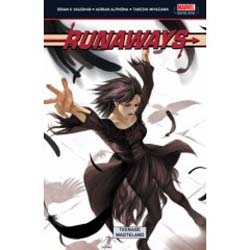UK EDITION

By Brian K. Vaughan, Adrian Alphona & Takeshi Miyazawa (Panini Publishing UK)
ISBN: 978-1-905239-76-4
It’s odd how one’s opinion can alter for seemingly inconsequential reasons. When I first reviewed this second volume (collecting issues #7-12 of the Marvel comic-book series) of the teen-friendly serial starring a bunch of kids who discover that their parents are big, fat liars one tragic night, it was as a glossy but diminutive paperback-sized digest.
Despite the writer being one of the best of the contemporary crop (and a personal favourite), and the plot using – not abusing – the continuity so painstakingly crafted by previous generations of writers, I just couldn’t warm to it. I found the art bland and nondescript and the plots disappointingly pedestrian. So it was with a little dread that I started thumbing through this standard-sized trade paperback released by Panini UK.
But something very odd happened: the characters didn’t seem so trite and obnoxious at full size and the art itself had some room to breathe. By the time I’d finished I wasn’t nearly as ambivalent as before. It seems that not all comics can be squeezed into any old format without suffering. Who knew?
So for newcomers and by way of recap: Six kids who have nothing in common except that their parents hang out together discover that those same adults are, in fact, a gang of super-villains intent on world conquest. Since all parents can’t be trusted anyway, the kids band together to use their own powers to bring them to justice. The adults have fingers in every pie, though. As the De Facto owners of Los Angeles it takes little more than a phone call to frame the Runaways for kidnapping each other and for a particularly grisly murder.
The kids find themselves a cool abandoned hide-out and rescue another boy with evil parents, only to fall foul of a timeless monster, and super-heroes Cloak and Dagger first hunt, (recruited by a cop in the pay of those ol’ evil parents to catch them) before teaming up with them. Unfortunately, the parents brain-wipe Cloak & Dagger as they go for reinforcements… otherwise the angst, soul searching, burgeoning hormones and infidelities, both real and imagined, would promptly come to a premature close.
This isn’t a full conversion on my part, however. I still have a few problems with how a painfully obvious marketing strategy seems to dictate a lot of the events here. But of course this isn’t primarily aimed at me or you (unless you’re a fan of Neighbours, Smallville, Hollyoaks et al, chockfull of whiny, precocious brats taking the puberty-equals-alienation theme to unequalled levels). The market this targets doesn’t want solutions or resolutions; it’s driven by a constant level of social, sexual and physical tension, not to say jeopardy, which simply wants the ride to continue. The trick here is to just keep on going until you’re cancelled. And besides, maybe some of this is genuinely fresh to younger readers.
That audience is just as welcome as anyone else in our constantly squeezed industry, so let’s provide for them and patiently wait for their hormones to stabilise. That’s when you can start suggesting Ditko, Kirby, Bellamy, Crumb, Baxendale, Pekar, Eisner, Alan Moore, Hergé, Hampson, Dudley Watkins, Moebius, Caniff and all those other masters of graphic narrative I’ve left out.
To conclude: If you’re reading something and you aren’t hating it, but not loving it either, maybe it isn’t the work itself. Maybe you’re just getting a headache from all that squinting… Get a bigger copy or a magnifying glass and try it again… I’m certainly glad I did.
© 2003 Marvel Characters Inc. All Rights Reserved.
